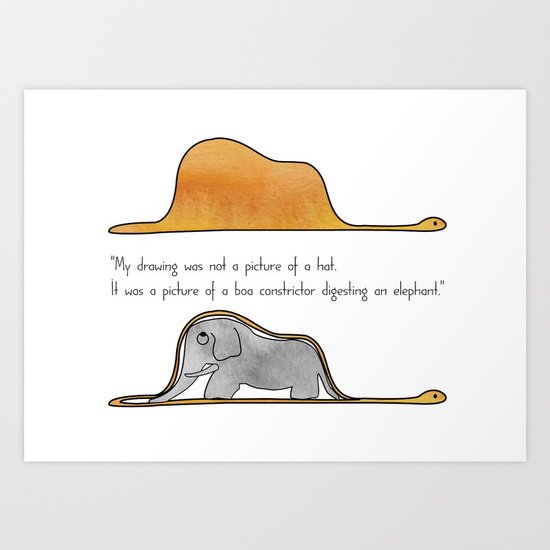Better Late Than Never

Why was ‘The Little Prince’ written for adults and not for kids? Because it was written to and for the author’s best friend, who fulfilled two decisive criteria:
able to understand every word + needing comfort
So did I, when I came across ‘The Little Prince’ as a grown-up: I could do with some comfort, and I was definitely able to follow his words. As a “Thank you” to Antoine de Saint-Exupery and a reminder to myself, I am writing what I took away from ‘The Little Prince’.

“If I could keep in mind that no mountain was high enough, then fear would really become something one can lose, and make space for curiosity.”

A Hat Versus an Elephant in a Giant Boa’s Stomach

How much are we already used to always needing explanations that make sense, and answers to every Why? And how much does it take to break this habit? Maybe you know the ‘I Spy’ game, back from when you were a kid. “I see something you don’t see”. I am not sure when exactly we unlearn our given power of imagination. But we all do, unless we consciously decide not to. And unlearning involves acting upon knowledge.
Most of the time, adult explanations have plenty to do with failures. That’s when we ask our Why’s. The logic of our adult world is: failure = you are not good at something or you’ve completely failed. This robs us of our courage, that much that we even adjust our conversations to not stand out and to resign ourselves to be less than we could be.
As kids we believe these words and bury some dreams right there. I’m guilty of it, too. But why do we not ask the Why’s, when we succeed? Couldn’t we then set ourselves up for success instead of failure? Why not do away with the fear of failure, the number one enabler of failures? Those who do ask the Why’s when succeeding, prove exactly that: There’s a time when there’s no need of questions. The magic lies in knowing when to ask, and when not to.
When You Ask, Though, Ask Again and Again
When you ask questions, you can find a myriad of interesting answers. When listening, don’t tie the thoughts to anything. Let them move freely and they are more likely to become happy thoughts. The next time you judge a book by its cover, ask yourself why you judge the way you judge. Find your own Why and never stop looking for all the others’ Why.

Thoughts Can Be Powerful & Need Immediate Attention
Just like the good and bad plants in ‘The Little Prince’, there are good and bad thoughts. If we don’t attend to bad thoughts immediately, they might grow big and become untamable - even dangerous. Where good thoughts are coming from is what we would like to know, since we’d love to go back there and get more of them. Mostly, we won’t find their source. But if we act upon the good ones we have, we can breathe a life of their own into them. If that’s not a valid reason for keeping good memories alive!
If You Stop Asking, It/You May Get Serious
Serious man illustration inspired by ‘The Little Prince’.
You could become someone trying to control, even if there’s nothing or no one to control. You could become addicted to vanity, needing to be admired 24/7. You could become an addict or an alcoholic, who doesn’t know if the egg was first, or the chicken. Then you’d drink because you are ashamed, and you’d be ashamed because you drink. You could become a serious person who counts things just to own them, and get a kick from numbers. Or have you become that already? You could suffer from lack of imagination, only able to think inside the box. Just like I do many times.
Since your mind is everything, why would you keep your everything in this little box? And why would you not keep it in balance?

The little prince on a mountain top.
My Personal ‘Little Prince’-Takeaway In Short:
unlearn → learn→ act
